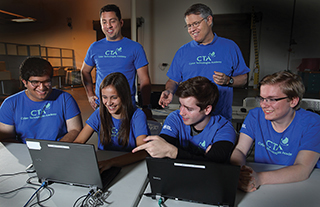
Cyber Technologies Academy Boot Camp developers include, bottom row, left to right: Anuj Kak, Samantha MacIlwaine, Makena Harmon, Evan Laufer (all 8965), and, top row, CW Perr and Steve Hurd (both 8966). (Photo by Dino Vournas)
Two hands-on Cyber Technologies Academy (CTA) teacher boot camps were recently held at Sandia/California to help improve and promote cyber security education.
Levi Loyd (8965) says the boot camps are an excellent way to reach out to science, technology, engineering, and mathematics (STEM) teachers who want to broaden their cybersecurity curriculum. The boot camps provided teachers with cyber lessons and training exercises they can take back to classrooms, thus helping prepare students for careers in cybersecurity.
“We have been involved in cyber-security education primarily focusing on students for quite a while,” says Levi. “We wanted to expand our focus and reach out to teachers to help engage students and get them interested in cybersecurity at an early age.”
Funded through Sandia’s corporate outreach program, the boot camps had more than 40 participants this summer. Teachers participating in the program came from across the state, including Fremont, Oakland, Sacramento, and southern California.
Force multiplier effect
Jeremy Erickson (8965) says by reaching out to teachers, the CTA multiplies its outreach efforts. Because of space, time, and budget constraints, Sandia can only reach out to approximately 250 students per year, but by reaching out to teachers, they in turn can potentially reach more students, he says.
“If 10 teachers each teach 50 or 100 students in their computer classes, we suddenly have expanded that reach to 500 or 1,000 students instead of just the normal number of students we reach out to each year,” he says.
Part of the goal in establishing the teacher boot camp, Jeremy says, was to deliver enough material to the teachers so they can then replicate the material to students.
“We are not educators,” he says. “We are scientists, researchers, and engineers. The idea was to partner up with professional educators who know how to teach and how to educate. We can provide the technical component that they may not be capable of doing.”
As part of the boot camp, Sandia provides teachers with a customizable learning platform in the form of a bootable Linux USB disk. This helps allow schools to boot directly from this Linux disk, leaving school systems able to stand alone.
Developing, strengthening collaborations
Last summer Sandia hosted several teachers from South Carolina and continues to strengthen its relationship with Project Lead The Way, a provider of K-12 STEM programs.
Carol Kinnard, associate director of instruction with Project Lead The Way in Indianapolis, Indiana, says the boot camp helped her better understand the ethical issues around cybersecurity, the Linux operating system as it applies to file structures and networking. She also said the boot camp helped her better understand how Internet protocols work and how some networking tools enabled her to protect some systems while exposing others to network penetrations.
She says Project Lead The Way will be developing a cybersecurity course that will be part of its high school computer science path.
“We are very interested in collaborating with Sandia, acknowledging that they are an industry leader in securing computer systems at all levels,” she says. “As we bring our national computer science curriculum to schools around the country, we are committed to staying relevant and timely, and we recognize cybersecurity is a pressing issue we all need to address.”
Chris Lorenz, instructor with Allied Health Academy at Valley View High School in Moreno Valley, California, says although the bootcamp was very challenging mentally, the Sandia instructors kept the teachers on track and answered all the questions to ensure they were successful.
“I would highly recommend this class to anyone who is interested in cybersecurity,” he says. “To actually work with industry professionals, such as those from the Sandia Labs, was so helpful and encouraging. The instructors were very knowledgeable and very helpful to all students. I also was impressed by how they addressed each student’s needs from the most experienced to the beginner.”
Lorenz says having access to Sandia’s materials and classroom program is a huge plus. He says he now has the tools to return to the classroom and begin teaching.
“I also feel I have a huge support system from the Sandia instructors and other staff if I run into any problems,” he says.
Future teacher boot camps are being planned and as Sandia continues to partner with more schools, offerings will be refined to address school-specific constraints or concerns.